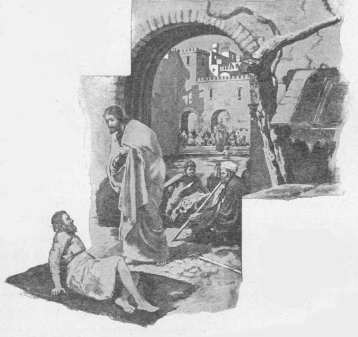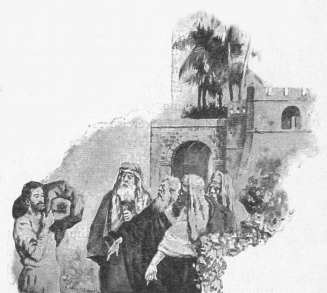|
Text
|
Comments
|
| .24
Verily, verily, I say unto you, He that heareth my word, and believeth
on him that sent me, hath everlasting life, and shall not come into condemnation;
but is passed from death unto life. Also lu1524,
ro0802. |
Those who hear and
believe have everlasting life although with bodies that are subject to
disease and death. When the final trumpet sounds, the righteous will be
changed to immortality 1co1550ff.
So, considering
the text in 1st Corinthians, how could Jesus say that those who hear His
word and believe would have everlasting life? First, by a spiritual resurrection
(born again) and second, with assurance that we can believe Christ's promises.
As we accept the conditions, we may hold the promises as reality.
Condemnation
From krisis, the result of judgment. Some translations read "judgment."
See on jn0318,19. Assuming that a believer
will bypass the judgment is inconsistent with other clear descriptions
of the judgment. ec1213,4,
he0927,
da0710. |
.25
Verily, verily, I say unto you, The hour is coming, and now is, when the
dead shall hear the voice of the Son of God: and they that hear shall live.
.26
For as the Father hath life in himself; so hath he given to the Son to
have life in himself;
27 And hath given him
authority to execute judgment also, because he is the Son of man. |
25 - Following from verse 24, we expect hearing the voice to bring
spiritual life. But notice, that He said that the hour was both "coming"
and "is now."
Again we have
two meanings, the physical and the spiritual
Physical:
Jesus raised the dead when He was here, and He will again at the time of
the resurrection at His coming.
Spiritual:
Jesus brought spiritual life to those who accepted Him when on earth, and
He continues to provide it for us now, through the Holy Spirit.
26
- Life in himself As we see in v28.
27
- Because he is the Son of man He faced temptation without
falling. He has the key to life. |
.28
Marvel not at this: for the hour is coming, in the which all that are in
the graves shall hear his voice,
29 And shall come forth;
they that have done good, unto the resurrection of life; and they that
have done evil, unto the resurrection of damnation.
.30
I can of mine own self do nothing: as I hear, I judge: and my judgment
is just; because I seek not mine own will, but the will of the Father which
hath sent me.
28
- All that are in the graves Not just those like Lazarus,
the daughter of Jairus, and the widow's son. He is the archangel whose
trumpet voice calls all the dead to life. First the righteous 1th0416
and later the wicked. See the note above.
28
- Shall hear His voice "I am he that liveth, and was dead;
and, behold, I am alive for evermore, Amen; and have the keys of hell and
of death."
re0118.
Jesus lived in human flesh
and died in order to destroy Satan's claim that we should not live. Seehe0214f. |
28
- More By His death and resurrection, Jesus authenticated
(clarified) His power over death and the grave. After that "hour" ( in
our verse and lu2253) He
would raise all the dead without credible challenge from Satan jude09;
re1210).
29
- They that have done good Then do good works save us? No
ep0208f.
See on re2212.
29
- Resurrection of life ... damnation The two resurrections.
We may confirm the harmony of Jesus' statement with the picture of the
two resurrections in Revelation 20. They are a thousand years apart re2005.
30
- Do nothing In coming to this earth in human form ph0206
subject to the same temptations 1co1013,
He depended on the Father as we may. He could have made the stones into
bread mt0403 but that
would have taken Him out of our class and Satan would have had an argument
that we could not be kept from sinning through Christ because He, Christ,
had an advantage! |
.31
¶ If I bear witness of myself, my witness is not true.
32 There is another
that beareth witness of me; and I know that the witness which he witnesseth
of me is true.
33 Ye sent unto John,
and he bare witness unto the truth.
34 But I receive not
testimony from man: but these things I say, that ye might be saved.
35 He was a burning
and a shining light: and ye were willing for a season to rejoice in his
light.
.36
But I have greater witness than that of John: for the works which the Father
hath given me to finish, the same works that I do, bear witness of me,
that the Father hath sent me.
37 And the Father himself,
which hath sent me, hath borne witness of me. Ye have neither heard his
voice at any time, nor seen his shape. |
31
- Witness of myself He appealed to the witness of John the
Baptist v32f, miracles v36, the Father, v37,
and to the Scriptures v39.
31
- Not true A little strange because Jesus is the truth
jn1406.
In jn0814 He declared His self-witness to
be true. Here He spoke from the viewpoint of the Jewish leaders v16.
Their Mishnah and Talmud (writings of Jewish interpretation and added rules
mr0707)
stated "No one may testify concerning himself." Other passages of Jesus
are like this arguing from the mindset of His listeners. See v18
and on v4 and lu1622.
Also in v41 He seems to explain His position
here.
32
- Another beareth witness This could be the Father mt0317
just mentioned. Some argue that the other is John the Baptist v33. In the
context, the Father's witness is better than John's. The text is inconclusive
and it doesn't matter because we see the whole picture. |
38 And ye have not his
word abiding in you: for whom he hath sent, him ye believe not.
.39
Search the scriptures; for in them ye think ye have eternal life: and they
are they which testify of me.
.40
And ye will not come to me, that ye might have life. |
35 -
Light
Literally, "lamp" compared to the true light which was Christ jn0109.
39
- Search the scriptures The statement may be translated as
in the KJV or as, "You search the scriptures. . . ." The latter seems to
better fit the context, but it doesn't matter.
40
- Come to me This means more than coming physically. It is
connected with belief – coming intellectually and spiritually. See jn0635,
jn0737f. |
.41
I receive not honour from men.
42 But I know you, that
ye have not the love of God in you.
.43
I am come in my Father's name, and ye receive me not: if another shall
come in his own name, him ye will receive.
.44
How can ye believe, which receive honour one of another, and seek not the
honour that cometh from God only?
45 Do not think that
I will accuse you to the Father: there is one that accuseth you, even Moses,
in whom ye trust.
.46
For had ye believed Moses, ye would have believed me: for he wrote of me.
47 But if ye believe
not his writings, how shall ye believe my words? |
42
- Love ... in you 1jo0410f.
43
- Another Consider Barabbas mr1507.
44
- Honor ... from God Literally, "... from the only God."ja0410,
2co1012.
45
- Do not think ... accuse you In one sense He was accusing
them right then. The point is that, the law was the accuser. It made the
case for their condemnation. See ro0707. |
 5 And a certain man was there, which had an infirmity thirty and
eight years.
5 And a certain man was there, which had an infirmity thirty and
eight years.
